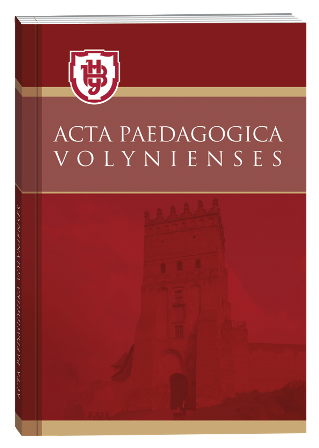MONITORING THE FORMATION OF ELEMENTARY SKILLS IN THE FIELD OF IT TECHNOLOGIES IN CHILDREN 4-5 YEARS OLD USING COMPUTER GAME PROGRAMS
DOI:
https://doi.org/10.32782/apv/2025.2.4Keywords:
IT competence, IT skills, monitoring, digital competence, information technology, preschool children, computer game programs, interactive learningAbstract
The article considers the issue of forming IT competence in children of senior preschool age as a component of the modern educational process. Particular attention is paid to the organization of monitoring this process, determining the criteria and indicators of the formation of IT skills in preschool children. The potential of gaming computer programs as an effective tool for the development of cognitive processes, logical and algorithmic thinking, fine motor skills, speech and spatial imagination is analyzed. The psychological and pedagogical conditions for the effective use of digital resources in working with preschoolers are outlined, and examples of software that is appropriate to use in the educational process are also given. In the modern information society, digital technologies are rapidly integrated into all spheres of life, including the educational space. IT competence is considered as a set of elementary knowledge, skills and abilities related to the use of digital technologies in cognitive and creative activities. Computer game programs adapted to the age capabilities of children 4–5 years old are an effective learning tool. To ensure the effectiveness of the use of game programs in working with preschool children, a number of conditions must be observed. The article highlights the problem of forming elementary skills in the field of IT technologies in children of middle preschool age. The possibilities of using computer game programs as a means of not only learning, but also pedagogical monitoring of the formation of IT competencies are considered. The criteria and indicators by which children are observed during interaction with educational games are outlined. The didactic potential of digital resources in the context of the development of logical thinking, fine motor skills, cognitive activity and information culture of the child is emphasized. Conclusions are drawn regarding the feasibility of systematic implementation of ICT in the practice of preschool education and the prospects for further research in this direction.
References
Дурманенко О.Л. Специфіка оцінювання якості освітньої діяльності закладу дошкільної освіти. Педагогіка формування творчої особистості у вищій і загальноосвітній школах. Категорія Б. м. Запоріжжя. № 83. 2022. С. 24–30.
Зайцева Н. П. Використання ІКТ у дошкільному навчальному закладі: нові можливості для розвитку дитини. Дошкільне виховання. 2019. № 4. с. 10–13.
Ігнатенко Т. О. ІКТ у розвитку пізнавальної активності дітей дошкільного віку. Інформаційні технології і засоби навчання. 2021. № 2(82). С. 45–52.
Кадемія М. Ю. Сучасні цифрові технології у дошкільній освіті: програми, ресурси, інструменти. Дошкільна освіта, № 2. 2020. с. 34–39.
Караман С. О. Комп’ютерні програми як засіб навчання дітей дошкільного віку. Науковий часопис НПУ ім. М. П. Драгоманова. Серія 5: Педагогічні науки. 2020. № 78. с. 84–88.
Пєшкова, В. В. Програмне забезпечення для дошкільної освіти: можливості, обмеження, перспективи. Освіта і розвиток обдарованої особистості. 2021. № 9(84), с. 40–45.
Скрипник О. В. Цифрові ресурси в освітньому середовищі дошкільного закладу. Комп’ютер у школі та сім’ї. 2020. № 5. С. 21–24.
Шелестова Л. В. Комп’ютерні технології в роботі з дітьми дошкільного віку : навч.-метод. посіб. К. Освіта. 2017.128 с.
Якименко О. С. Дидактичний потенціал інтерактивних ігрових програм у формуванні ІКТ- компетентності дошкільників. Дошкільне виховання . 2019. № 74. С. 89–93.
Liudmyla L. Markivska, Natalia M. Siruk, Oksana L. Durmanenko, Rymma O. Redchuk and Liudmyla M. Tarasyuk. Modern Society Challenges: Youth Communication in Instagram. Modern Society Challenges. International journal of Criminology and Sociology. Web of Science. DOI: https://doi.org/10.6000/1929-4409.2020.09.379.2021. Vol. 9. С. 3124–3133.
Plowman, L., Stephen, C. (2013). Digital play: A new classification. Early Years: An International Journal of Research and Development. 2013. 33(2), 123–136.







